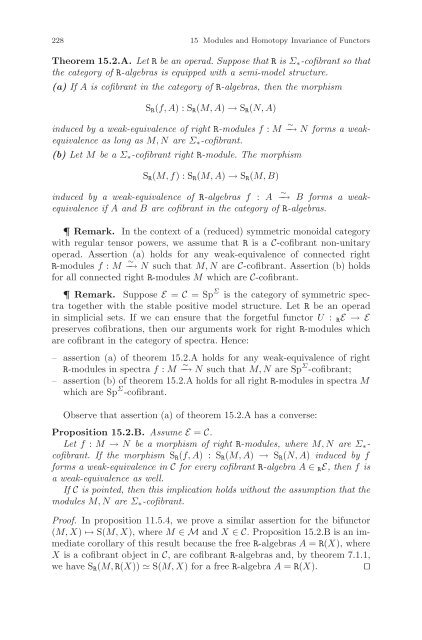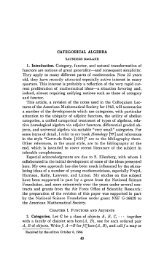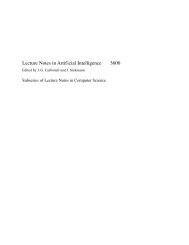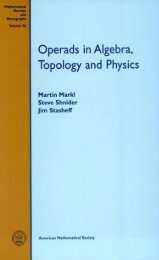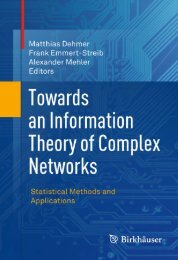Symmetric Monoidal Categories for Operads - Index of
Symmetric Monoidal Categories for Operads - Index of
Symmetric Monoidal Categories for Operads - Index of
Create successful ePaper yourself
Turn your PDF publications into a flip-book with our unique Google optimized e-Paper software.
228 15 Modules and Homotopy Invariance <strong>of</strong> Functors<br />
Theorem 15.2.A. Let R be an operad. Suppose that R is Σ∗-c<strong>of</strong>ibrant so that<br />
the category <strong>of</strong> R-algebras is equipped with a semi-model structure.<br />
(a) If A is c<strong>of</strong>ibrant in the category <strong>of</strong> R-algebras, then the morphism<br />
SR(f,A) :SR(M,A) → SR(N,A)<br />
induced by a weak-equivalence <strong>of</strong> right R-modules f : M ∼ −→ N <strong>for</strong>ms a weakequivalence<br />
as long as M,N are Σ∗-c<strong>of</strong>ibrant.<br />
(b) Let M be a Σ∗-c<strong>of</strong>ibrant right R-module. The morphism<br />
SR(M,f) :SR(M,A) → SR(M,B)<br />
induced by a weak-equivalence <strong>of</strong> R-algebras f : A ∼ −→ B <strong>for</strong>ms a weakequivalence<br />
if A and B are c<strong>of</strong>ibrant in the category <strong>of</strong> R-algebras.<br />
¶ Remark. In the context <strong>of</strong> a (reduced) symmetric monoidal category<br />
with regular tensor powers, we assume that R is a C-c<strong>of</strong>ibrant non-unitary<br />
operad. Assertion (a) holds <strong>for</strong> any weak-equivalence <strong>of</strong> connected right<br />
R-modules f : M ∼ −→ N such that M,N are C-c<strong>of</strong>ibrant. Assertion (b) holds<br />
<strong>for</strong> all connected right R-modules M which are C-c<strong>of</strong>ibrant.<br />
¶ Remark. Suppose E = C =Sp Σ is the category <strong>of</strong> symmetric spectra<br />
together with the stable positive model structure. Let R be an operad<br />
in simplicial sets. If we can ensure that the <strong>for</strong>getful functor U : RE → E<br />
preserves c<strong>of</strong>ibrations, then our arguments work <strong>for</strong> right R-modules which<br />
are c<strong>of</strong>ibrant in the category <strong>of</strong> spectra. Hence:<br />
– assertion (a) <strong>of</strong> theorem 15.2.A holds <strong>for</strong> any weak-equivalence <strong>of</strong> right<br />
R-modules in spectra f : M ∼ −→ N such that M,N are Sp Σ -c<strong>of</strong>ibrant;<br />
– assertion (b) <strong>of</strong> theorem 15.2.A holds <strong>for</strong> all right R-modules in spectra M<br />
which are Sp Σ -c<strong>of</strong>ibrant.<br />
Observe that assertion (a) <strong>of</strong> theorem 15.2.A has a converse:<br />
Proposition 15.2.B. Assume E = C.<br />
Let f : M → N be a morphism <strong>of</strong> right R-modules, where M,N are Σ∗c<strong>of</strong>ibrant.<br />
If the morphism SR(f,A) : SR(M,A) → SR(N,A) induced by f<br />
<strong>for</strong>ms a weak-equivalence in C <strong>for</strong> every c<strong>of</strong>ibrant R-algebra A ∈ RE, thenf is<br />
a weak-equivalence as well.<br />
If C is pointed, then this implication holds without the assumption that the<br />
modules M,N are Σ∗-c<strong>of</strong>ibrant.<br />
Pro<strong>of</strong>. In proposition 11.5.4, we prove a similar assertion <strong>for</strong> the bifunctor<br />
(M,X) ↦→ S(M,X), where M ∈Mand X ∈C. Proposition 15.2.B is an immediate<br />
corollary <strong>of</strong> this result because the free R-algebras A = R(X), where<br />
X is a c<strong>of</strong>ibrant object in C, are c<strong>of</strong>ibrant R-algebras and, by theorem 7.1.1,<br />
we have SR(M,R(X)) � S(M,X) <strong>for</strong>afreeR-algebra A = R(X). ⊓⊔


